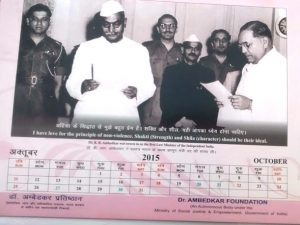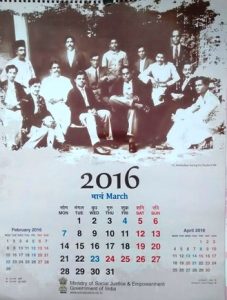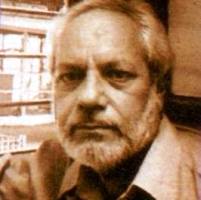 While on the one hand, the BJP governments at the Centre and in the states are trying to lure Ambedkar’s supporters by organizing all sorts of programmes to mark Babasaheb’s 125th birth anniversary, on the other hand, the party, at the behest of the RSS, is trying to undermine the basic ideology of Ambedkar.
While on the one hand, the BJP governments at the Centre and in the states are trying to lure Ambedkar’s supporters by organizing all sorts of programmes to mark Babasaheb’s 125th birth anniversary, on the other hand, the party, at the behest of the RSS, is trying to undermine the basic ideology of Ambedkar.
All governments – irrespective of the party in power – have been using the name of Babasaheb to grab power and to retain it. Prime Minister V.P. Singh had established Dr Ambedkar Pratisthan to mark Babasaheb’s birth centenary. Its office was initially located at 25, Ashok Road, New Delhi. The next government shifted it to Janpath Road. Meira Kumar, who was a minister in the UPA government, had almost made up her mind to move it outside Delhi. However, she had to back out following popular protests.
Along the lines of what the V.P. Singh government did, Narendra Modi, who heads the current BJP dispensation, had promised grand 125th birth anniversary celebrations immediately after coming to power. V.P. Singh and his government had actually done work on the ground in the name of Babasaheb. However, Modi and his cohorts are only paying lip service to him.
Like every year, in 2016 too, the calendar designed by Dr Ambedkar Pratisthan was published by the Government of India’s Ministry of Social Justice and Empowerment. However, unlike all the earlier calendars, this one also carries the photograph of the prime minister. Moreover, its size and placement is such that one’s eyes fall first on Modi and then on Ambedkar.
There is more. The earlier calendars carried a quote of Ambedkar relating to the welfare of society and human race below his photograph. The 2016 calendar does not have a single quote of Ambedkar. Singing paeans to a person is of no use if his ideology and thoughts are not publicized. Quotes inspire, they show the way, they encourage, they fill our life with light, they remove the cobwebs from our minds, and they give us a new vision. Among all those who worked for the emancipation of society, Dr Ambedkar’s quotes stand out for their inspirational value.

The quotations of Ambedkar, which the Pratisthan was hitherto publishing in the calendar, dealt a heavy blow to the anti-social elements and showed us the way to fight their depredations. They gave a philosophical and, at the same time, practical insight into the inequality pervading society. They talked about the pain – and the ways to deal with it. One speciality of Dr Ambedkar’s writings was that they contained instances either from the deformed Indian society or from ordinary life. Dr Ambedkar’s quotations were not flights of fancy. They were rooted in the real-life truths and behaviours.
The calendar is proof enough of what the real objective of the BJP and the RSS behind celebrating Ambedkar’s 125th birth anniversary is. Now, it is up to the Ambedkarites to counter this conspiracy.
Another example: The BJP and the Sangh Parivar have been consistently using the word “samrasta” (harmony) instead of “samanata” (equality). This flies in the face of Ambedkar’s ideology. Does it not prove that by shouting “samrasta” in chorus, the BJP and the Sangh Parivar are trying to bury the basic spirit of Babasaheb’s slogan “Samta, Samanata aur Maitri”?

Here, it would be pertinent to recount a conversation I had with Kanshi Ram when I met him at a function on Lodhi Road in my capacity as a journalist. I asked him why, instead of Maharashtra (Nagpur), where Ambedkar worked all his life, he had chosen Uttar Pradesh to launch his politics. He said it was because in Maharashtra (Nagpur), Babasaheb had been completely saffronized. The Shiv Sena and the RSS had turned Ambedkar into a “god” in Maharashtra. The Dalit movement of that state was all but dead. Uttar Pradesh was the only state where the Dalits were aware of Ambedkar and his legacy. But they never got proper leadership. The RPI was nowhere to be seen in the state. B.P. Maurya had jumped on the Congress bandwagon and the Dalit movement had lost its steam. That was why, Kanshi Ram said, he had chosen Uttar Pradesh to fulfil the dreams of Ambedkar.
Today, Kanshi Ram’s foresight is being vindicated. The central government and its head, Modi, are parroting Ambedkar’s name and hailing him on his 125th birth anniversary but what the BJP and the Sangh Parivar actually want is to accord him the status of “god” and draw political mileage out of it. It is akin to the way Muslim Sai Baba was snatched from the Muslims and turned into a money-spinner. What I am saying can also be seen in the Hindutavadi/brahmanical names given to programmes being launched in the name of Babasaheb Ambedkar. “Panch Tirth’ is only one example. There are many more.





